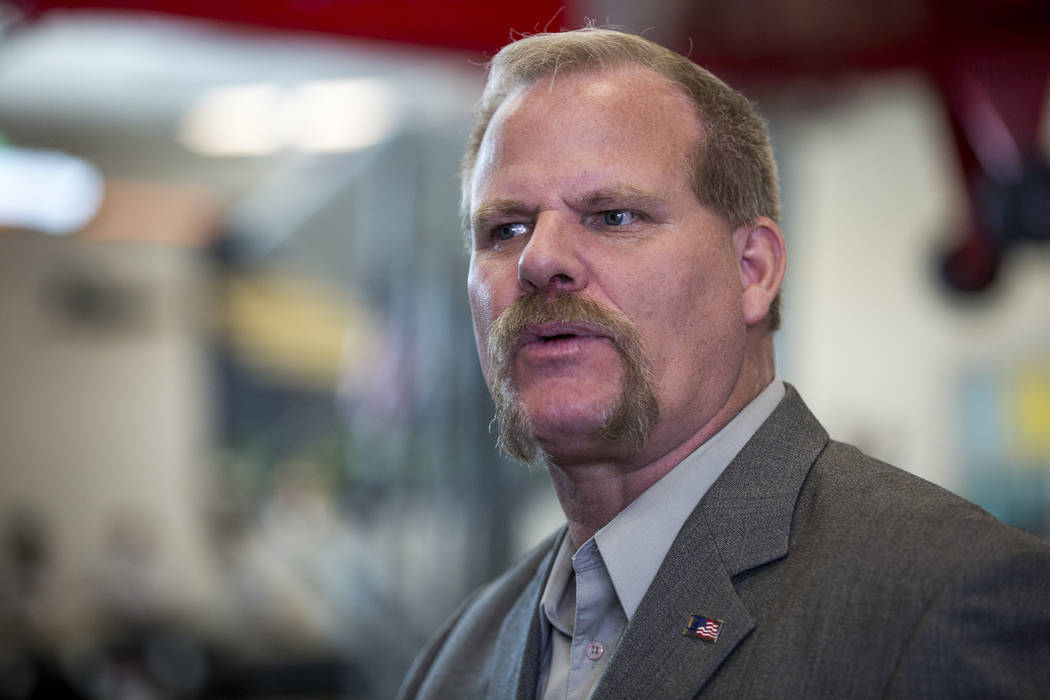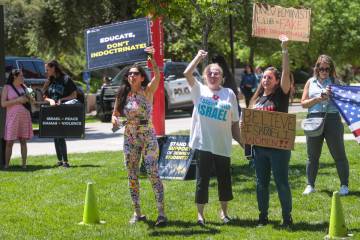Court rules CCSD must release Kevin Child records
The Clark County School District must release all documents it has withheld regarding the behavior of Trustee Kevin Child, according to a state Supreme Court ruling Thursday that rejected the district’s efforts to keep the records secret.
The ruling came during early voting in the midterm election in which Child is seeking re-election to his District D seat, running against Irene Cepeda. It was not clear if the ruling would lead to the release of additional documents before Election Day on Nov. 6.
In its unanimous ruling, the state court upheld a District Court decision to order disclosure of the documents. The Review-Journal’s pursuit of the records pertains to complaints about Child’s behavior around staff and students and a four-page CCSD investigative memo independently obtained by the newspaper in December 2016.
The justices reversed one portion of the lower court’s decision that said the school district should redact only names of students, support staff or victims of alleged sexual harassment.
“Problematically, this list excludes teachers or witnesses who may face stigma or backlash for coming forward or being part of the investigation,” the opinion said. “The privacy interest of these persons should be considered before disclosure of their names or other information that would identify them.”
The justices returned the case to the District Court to consider if additional redactions might be required before the documents are released.
But Review-Journal Executive Editor Glenn Cook said the school district should hand over the records on Monday with redactions.
“Allowing the District Court to settle redactions will ensure that voters are kept in the dark about additional allegations against Trustee Child,” Cook said Thursday. “Voters can’t cast an informed ballot if they are denied crucial information about a candidate’s performance in office.”
Central arguments rejected
The court rejected the district’s main argument that its regulations, which deemed the documents confidential, are legally binding.
The justices cited a previous decision to conclude that those regulations do not limit the scope of the public records law.
“Ascribing a force to such regulations that limits the (Nevada Public Records Act) would create an opportunity for government organizations to make an end-run around the NPRA by drafting internal regulations that render documents confidential by law,” the opinion said.
The district also argued that the documents are protected under the deliberative process privilege, which the court also rejected.
“To allow CCSD to invoke the deliberative process privilege to prevent disclosure of the investigative materials … would allow CCSD to shield itself from the Review-Journal’s inquiry into how CCSD conducted that investigation,” the court wrote.
After filing a lawsuit seeking the documents in District Court, the Review-Journal received more than 100 pages of records documenting concerns with Child’s behavior. The records request stemmed from former Superintendent Pat Skorkowsky’s directive to restrict the trustee’s access to schools and district offices.
The Review-Journal obtained a memo detailing that an internal investigation concluded that Child created a hostile work environment, holding impromptu “suicide counseling sessions” with students and causing anxiety among female employees.
The investigation also concluded that Child violated district policy on harassment, and by extension the Title VII of the Civil Rights Act of 1964.
But the district took issue with releasing investigative materials, arguing in part that releasing documents on discrimination investigations will deter people from reporting issues in the future.
The district said in a statement that it respects the Supreme Court’s ruling and is reviewing it to determine how to comply.
Review-Journal attorney Maggie McLetchie said that the Supreme Court correctly found that the district’s arguments for full secrecy were unwarranted.
“It also recognized the importance of getting voters information about the allegations against Trustee Child —and information about how CCSD handled those allegations,” she said in a statement. “We now hope CCSD stops playing games and finally allows the public to fully assess Child’s conduct.”
Child wants ‘everything’ out there
In March, the district settled with former Deputy Superintendent Kim Wooden over what sources say were issues with Child’s behavior.
Child since has sued the district, several School Board trustees, Wooden and other officials alleging defamation, civil conspiracy and more. In the lawsuit, he argues that the investigation that produced documents was an attack on his character contrived by Skorkowsky because he has asked the district tough financial questions.
Contacted about Thursday’s ruling, Child argued against redacting even more names from the documents. He said that people should be required to stand behind their allegations.
“You can’t just make a statement and not be held accountable for it,” he said. “That’s unfair. I want everything to be out there.”
But he added in a later statement that he applauded the court’s decision to release the alleged complaints.
He argued that there was no investigation and that he was not allowed to know who complained — with the exception of one person — or given the opportunity to confront the accusers.
“Then, when I refused to sign a secret settlement with the chief accuser, the complaint was changed to one against the district and promptly approved by the four trustees while the district refused to release the agreement, even though it was funded with public dollars,” the statement said.
Contact Amelia Pak-Harvey at apak-harvey@reviewjournal.com or 702-383-4630. Follow @AmeliaPakHarvey on Twitter.




























